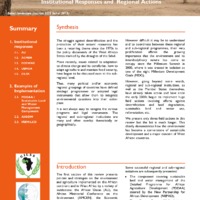Recherche
1 item
Desertification and climate change institutional responses and regional actions
The struggle against desertification and the protection of their natural resources has been a recurring theme since the 1970s in the policy documents of the West African States marked by the droughts of the Sahel. More recently, issues related to adaptation to climate change and its corollaries, how to adapt agriculture and maintain food security, have begun to be discussed even at the subregional level. Thus, many political and/or economic regional groupings of countries have defined strategic programmes or adopted legal instruments that allow them to integrate environmental questions into their action plans. It is not always easy to navigate the various programs and legal instruments. The regional and sub-regional institutions are many and often overlap thematically or geographically. Introduction The first section of this review presents policies and strategies on the environment and agriculture implemented on the African continent and in West Africa by a variety of institutions: the African Union (AU), the African Ministerial Conference on the Environment (AMCEN), the Economic Community of West African States (ECOWAS), the West African Economic and Monetary Union (UEMOA), and the Permanent Interstates Committee for Drought Control in the Sahel (CILSS). However difficult it may be to understand and to coordinate between these regional and sub-regional programmes, their very proliferation affirms the growing importance that the environment and its interdisciplinary nature has come to occupy since the Millenium Summit in 2000, where it was treated in isolation as one of the eight Millenium Development Goals (MDG). However, going beyond mere words, regional and sub-regional institutions, as well as the Member States themselves, have already taken action and have since the early 2000s begun to implement huge field actions involving efforts against desertification and land degradation, sustainable land and water use, reforestation, etc. We present only three field actions in this review but the list is much longer. This clearly demonstrates how the environment has become a cornerstone of sustainable development and a major concern of West African countries
